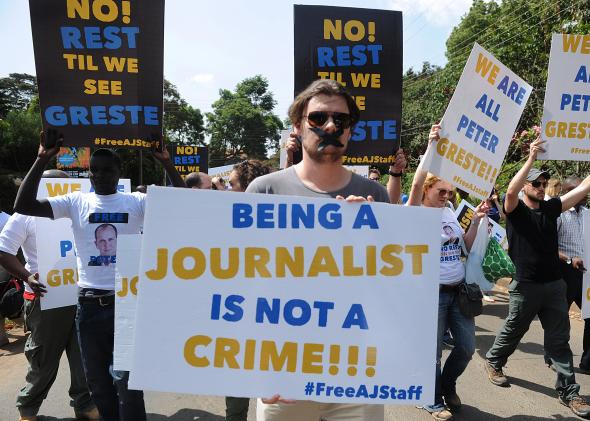Netizen Report: In Egypt and Saudi Arabia, Terror Laws Threaten Free Speech

Photo by SIMON MAINA/AFP/Getty Images
The Netizen Report originally appears each week on Global Voices Advocacy. Hae-in Lim, Lisa Ferguson, Bojan Perkov, Sonia Roubini, Ellery Biddle, and Sarah Myers contributed to this report.
Global Voices Advocacy's Netizen Report offers an international snapshot of challenges, victories, and emerging trends in Internet rights around the world. This week's report begins in Egypt, where 20 journalists employed by Al Jazeera are facing terror-related charges. They stand accused of assisting terrorist efforts to “influence international public opinion” and of presenting “unreal scenes” that suggest Egypt has descended into civil war.
But many observers say these journalists were simply doing their jobs. On independent Egyptian news site Mada Masr, Democracy Now’s Sharif Abdel Kouddous wrote, “the charges would be comical if they weren't so serious.” He continued:
The much-hailed new constitution guarantees freedom of thought and opinion, yet those with dissenting thoughts and opinions are targeted. Freedom of the press is guaranteed, yet journalists are behind bars. Why even refer to rights and legislation when those enforcing the law are its most egregious violators?
Al Jazeera has created a timeline of events surrounding the arrests. A full English translation of the journalists’ charge sheet can be found on the New York Times website. Amnesty International, the Committee to Protect Journalists, and many other human rights groups are demanding the journalists be released.
Meanwhile, Egypt’s Ministry of Justice released a draft bill last week that would criminalize the use of online platforms (the bill explicitly mentions Facebook) to “directly or indirectly promote acts of terror” in the country.*
And Egypt is not the only country in the Arab region where dissent is being quashed by terror allegations. On Feb. 2, the royal cabinet of Saudi Arabia enacted a new counterterrorism law that will “allow the government to label any Saudi who demands reform or exposes corruption as a terrorist,” according to Human Rights Watch. The new law will codify many of the practices that the Saudi government already uses to target public dissent.
Free Expression: Serbia’s deputy PM saved by the DMCA.
In Serbia, a viral video mocking an appearance by Deputy Prime Minister Aleksandar Vucic on national news was removed from YouTube due to alleged copyright infringement. Administrators of Serbian websites that featured the video found their sites temporarily blocked and social media accounts hacked. Independent Journalists’ Association of Serbia, Independent Journalists’ Association of Vojvodina and SHARE Foundation published a press release [link in Serbian*] condemning the use of copyright provisions to impose censorship. Vucic has since claimed that he wasn’t responsible for the removal of the video and later re-posted the satire on his Facebook page.
A Turkish bill that would give the government broad censorship and surveillance powers was submitted to Parliament this week. More on the bill is available here.
Surveillance: The Sochi spy regime.
Russia’s Federal Security Service (FSB) will keep a close watch over foreign visitors during the XXII Winter Olympics in Sochi with its new digital surveillance system. Personal information of organizers, athletes, and journalists will be compiled into a telecommunications database, along with a wide range of metadata, including “connections, traffic, and subscriber payments.” The November 2013 government decree [link in Russian] authorizing this type of surveillance also permits the FSB to retain and analyze the data for three years after the Sochi games. This has ignited fears that the Russian government could use the data against foreign journalists for years to come.
Relatedly, Russian opposition blogger Alexei Navalny has launched an interactive website this week outlining the “true costs” of the Olympic preparations in Sochi.
The latest Snowden revelations concern Canada, where the Communications Security Establishment Canada, the country’s cybersecurity agency, allegedly test-ran a technology that enabled it to track any device that connected to the free Wi-Fi offered in a Canadian airport. CSEC head John Forster defended the agency on grounds that the test didn’t run in real-time and wasn’t an actual operation.
Privacy: How did the NSA snatch encryption keys?
An appeal by encrypted email provider Lavabit against the Justice Department may, for the first time, provide insight into how government organizations like the NSA obtain the encrypted SSL keys that enable to it eavesdrop on some web communications. Lavabit shut down in early August 2013 after being asked to provide SSL keys to the FBI.
Industry: Netizens say bye-bye to Weibo.
Chinese microblog site Sina Weibo has lost members for the first time since 2010. Possibly because of a government crackdown on online speech, membership in Weibo declined by 9 percent over the past year.
Online education platform Coursera blocked access to its services in Cuba, Iran, Syria, and Sudan—all countries under U.S. economic sanctions—after receiving a warning from the US State Department. Thanks to an exception for educational tools, Coursera has since reinstated access in Syria. No such luck for Cuban, Sudanese, or Iranian students.
New rules from the Justice Department allowed technology companies to provide more detailed information on national security-related data requests they receive from the U.S. government. Facebook, Google, Microsoft, and Yahoo break down the requests into three categories in their reports released Feb. 3—FISA content requests, FISA non-content requests, and national security letters.
Internet Governance: Pick you poison, Bhutan.
The Bhutan government has come under criticism for its plans to migrate all internal communications to Google servers hosted outside Bhutan. Officials say the program will help the nation to become more eco-friendly and will help secure government websites, which have been frequently hacked in the past. Critics including the Bangalore-based Centre for Internet and Society have expressed concern that this will leave the country vulnerable to surveillance by the United States.
North Korea unveiled a new, tightly controlled Intranet called Kwangmyong, or “Bright.” The country has rolled out several other information technologies platforms recently, including an OS, the Microsoft-clone known as “Red Star,” and a search engine called “Our Country.”
Internet Insecurity: Data spill proves corruption among Chinese elites.
A terabyte leak that occurred in China more than a year ago may now threaten the legitimacy of China’s ruling Communist Party. Amid rising public discontent over official corruption, the International Consortium of Investigative Journalists has identified 22,000 Chinese elites, many with family ties to political leaders, who concealed their wealth in offshore tax havens. China’s state-run media has called the use of leaked data to sabotage political leaders as “Internet terror.” The database webpage and all reports of the leak have been blocked inside China.
Publications and Studies
- “Mapping Digital Media: Guatemala”—Open Society Foundations
- “Soft Censorship: Strangling Serbia’s Media”—World Association of Newspapers and News Publishers
- “Capturing Them Softly: Soft Censorship and State Capture in the Hungarian Media”—World Association of Newspapers and News Publishers
- “Unmasking the Arzeshi: Iran’s Conservative Cyber Activists and the 2013 Presidential Election”
- “Iranian Internet Infrastructure and Policy Report”—Small Media
*Correction, Feb. 5, 2014: This blog post originally and incorrectly referred to Egypt's Parliament; Egypt does not have a Parliament, and the mentioned bill came from the Ministry of Justice. The post also incorrectly said that an external link was in Russian; it was actually in Serbian.
Future Tense is a partnership of Slate, New America, and Arizona State University.

